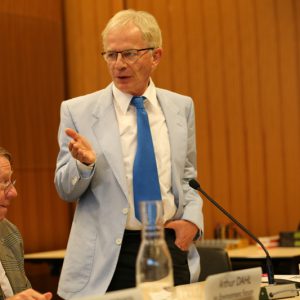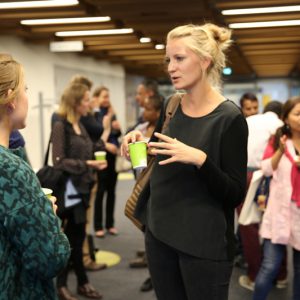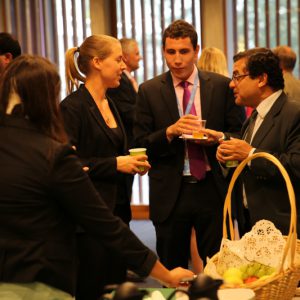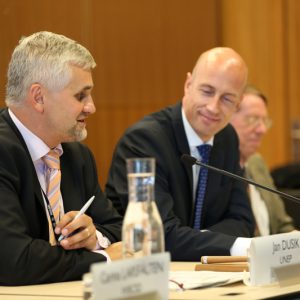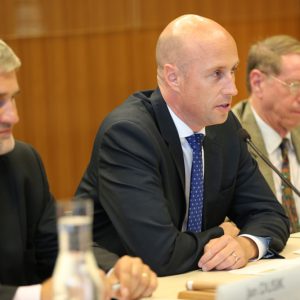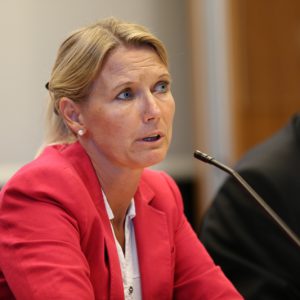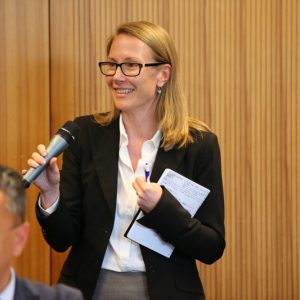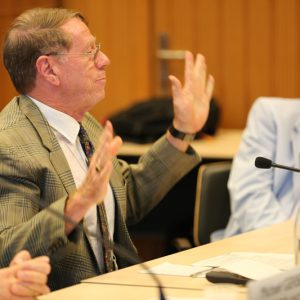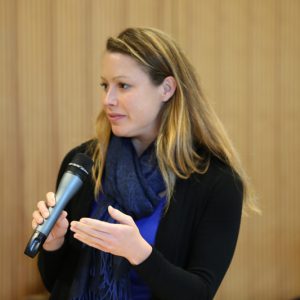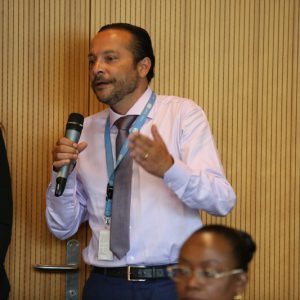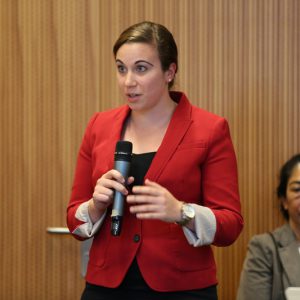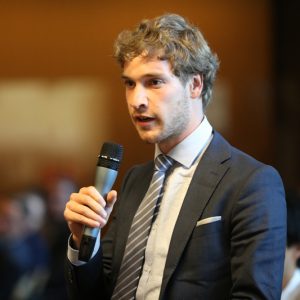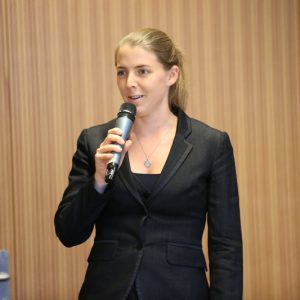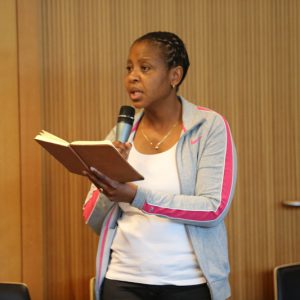Event
GEPP Policy Dialogue on SDGs
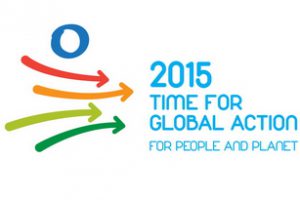
02 Sep 2015
16:00–18:30
Organization: Geneva Environment Network
BACKGROUND
The RIO + 20 Report ‘The Future we Want’ established a mandate to develop a set of sustainable development goals (SDGs) and appropriate action that is coherent with and integrated into the UN development agenda. A United Nations Summit for the post-2015 development agenda will be held from 25 to 27 September 2015 in New York. It will be a high-level plenary meeting of the UN General Assembly.
This Policy Dialogue co-organized by UNEP and UNIGE, with the support of the Geneva Environment Secretariat, during the GEPP Executive Summer School 2015 addressed the key challenges of implementing and monitoring the SDGs at a time when political commitment and resource allocation is problematic. The invited panellists expressed their viewpoint and debated the following questions with the audience.
- How will the universality of the 17 SDGs be applied in practice in developed countries and who will be responsible for implementing them?
- Are the SDGs applicable as such or will adjustments be needed at regional, and sub-regional or metropolitan levels before their implementation?
- How can the SDGs be financed? Can stakeholders from the financial and insurance sectors be encouraged to contribute?
- What methods and tools can be applied to monitor the SDGs and who is responsible for this task?
- What lessons can be learnt from the achievements and limitations of MDGs?
AGENDA
15.30 – 16.00
Refreshments
16.00 – 17.15
Welcome
Prof. Roderick LAWRENCE, GEPP Programme Director
Introduction
Jan DUSIK, Director, UNEP Regional Office for Europe, Chair of Panel
Panelists’ Debate
Ambassador Michael GERBER, Swiss Agency for Development and Cooperation (SDC)
Carina LARSFÄLTEN, Managing Director Global Policy and Strategic Partnerships, World Business Council for Sustainable Development (WBCSD)
Arthur DAHL, President, International Environment Forum
17.15 – 18.30
Dialogue with Audience
INTRODUCTION
Jan Dusik remembered that 2015 marks the 70th anniversary of the establishment of the United Nations – a year not only to celebrate its achievements, but also to reflect on the challenges and opportunities now and in the future, across the three fundamental pillars of our work on peace and security, development, and human rights.
If we look back how far we have come:
– from the foundation years of the 1940-1950s to promote peace, social progress, freedom, justice and quality;
– to the development decades of the 1960-1970s where the world experienced the independence many countries, and also establishment of UN institutions dealing with the environment, human settlements, population;
– to the ‘lost decade for development‘ of the 1980s that witnessed deficits and debt and the painful reality of structural adjustment and reversal in development progress [1980-1992 ODA=0.33% of GN Income];
– to the 1990s that started with human development high on its agenda, and the first Rio conference that adopted the blue print for sustainable development – Agenda 21, but will go down in history as the ‘decade of broken promises. [ODA target 0.7%];
– to the year 2000 -2012 a new Millennia and a promising era with serious and concerted attempt to eradicate global poverty;
– to Rio+20 conference in June 2012 that lay the foundation for our discussion here today, and that common vision for “The Future We Want” – an integrated and universal United Nations development agenda beyond 2015.
In the course of the last two years, we have witnessed one of the most unprecedented process of public engagement and intense process of Member States to developing the sustainable development goals (SDGs) across the globe.
That work has come to an end on 2nd August 2015, with an agreed consensus draft outcome document entitled “Transforming Our World: The 2030 Agenda for Sustainable Development” with 17 Sustainable Development Goals (SDGs) and 169 targets.
The outcome document is expected to be presented for consideration at the seventieth session of the United Nations General Assembly and for adoption at United Nations Summit.
Lessons and challenges we need to draw from what we know so far, and also teasers for the five questions for the discussion:
Looking at the current sets of SDGs, we have half of them directly environmental in focus or address sustainability of natural resources: from poverty to food and agriculture, to water and sanitation, to energy, human settlements, SCP, climate change, oceans, terrestrial ecosystems. At the same time, over 86 targets that concern environmental sustainability, including at least one in each of the 17 SDGs.
Environmental sustainability has major prominence and to our Swiss colleagues it is important to acknowledge your consistent support for the Global Environmental Goals, and call for strengthen environmental governance and political will needed for the protection of the environment.
- The universality of the agenda: sustainable development is not only an issue of priority for the developing and emerging economies but indeed must encompass and engage all countries and nations across the planet. The problems, challenges and opportunities are not limited to one region or one country. They are intertwined in nature and their impact. It also shows we all live in an integrated world and the challenges we have need to be addressed through integrated approaches, including political commitment and action by all countries and stakeholders.
Climate change, for example, is beyond the control and the means of any individual nation in terms of taking singular action. If it is indeed a shared agenda, then it also requires a collective response!
- Second element is the principle of integration: this time around we cannot afford to think and function sustainable development is about three separate pillars requiring three separate domains of action. Economic progress at the expense of social equity or environmental sustainability no longer an option. We have seen the impact of scarifying equity and social stability in the name of fast economic progress. As the SG called it in his Synthesis report: an integrated agenda for economic, environmental, and social solutions.
- Third and more of a question for all of us is: how do we guarantee the unprecedented level of participation and engagement from all sides in the implementation of the 2030 Agenda for Sustainable Development? This is also tied up to the whole issue of monitoring, but to a larger extent accountability at all levels. We need build capacities and also strengthen institution to achieve progress on sustainable development.
- Four, this new agenda requires a significant investment for its implementation. No question about the significant role that needs to be played by the private sector (including finance and insurance) to bring the solutions to advance this agenda for people, planet and prosperity.
- Five, we should not be blinded by the significant investment in terms of financing. We have to invest a lot in fixing the systemic problem we have on policy and institutional coherence, bring the right mix of stakeholders and partnerships for the task at hand. We can throw billions into a system or bring in all kinds of partners, but if we don’t effectiveness and appropriate policies to achieve our development objectives, then progress on sustainable development will remain an aspiration.
- Six, one of the lessons we have learnt from the MDGs implementation is that: if the world is inflicted by hunger and disease, the solution cannot come by providing massive amounts of food and medicine. That is a short term fix. It needs a different form of solidarity and long term solution by looking at the root causes of the problem. How many lives can be saved if investment is directed to improve the agriculture sector and practices, or building a more resilient health system?
- Last but not least, the new agenda has every element to put us all on a path to a more equitable, fair, just and sustainable planet. And as we also mark the 70th anniversary of the United Nations, a larger lesson has to be drawn for all us – that the United Nations is still the forum in which countries agree on both a shared agenda and a collective response to the many challenges that we face today and in the future. And, we are indeed at the cross roads of a transformative era for people, planet and prosperity.
- UNEA-2 that will focus on “Delivering on the environmental dimension of the 2030 Agenda for sustainable development.
PANEL DISCUSSION
The presentations can be downloaded below.
Government Perspective
There is a general consensus that government must champion their successful implementation as the institutions who were ultimately responsible for the development of the SDGs. For individual governments, the challenge is translating the global goals to a regional and national context in a way that is transparent and inclusive of their citizens’ interests. There is a significant amount of complexity built into the architecture of the process (partnerships, financing, reviews, reporting) at the international level and therefore governance processes and capacity building will be required to ensure no countries are left behind. The partnership dimension of the SDGs is new and governments will have a key role to play instigating productive partnerships that avoid duplication of effort and ensure coherent strategies among diverse groups of stakeholders.
Business Perspective
The sheer amount of capital required for implementing the SDGs makes the private sector extremely important to this process, as business is the most efficient way to move capital. Additionally, the way businesses source, invest, employ, and spend all have significant influence on sustainable development. Achieving corporate buy-in is about proving the business case rather than the merits of the SDGs. Proving this case will involve communicating that the SDGs provide the private sector with various practical advantages and business opportunities including, focused investment flows; definitions of new/emerging markets; access to new capital for companies that can offer SDG solutions; definition around future trends and policies; common language; and the opportunity to strengthen a company’s license to operate.
Civil Society Perspective
It is clear that society is shifting away from economic measures of development to human-centered measures and value-based indicators. The SDGs are aimed at civil society more broadly and not just government. Nested structures of responsibility for implementation will be required as some things are just not possible to achieve by only policy. A key challenge for engaging civil society in delivery of the SDGs will be to take the very impressive process and translate them into a language that people will identify with and rally around. Additionally, it is important to recognize that a large part of humanity simply will not care about the goals and will be motivated by forces that work counter to them so our strategies must assume such.
Full video of the panel discussion
DOCUMENTS AND LINKS
https://www.genevaenvironmentnetwork.org/wp-content/uploads/2020/05/gepp_sdgs_intro_slide.pdf
https://www.genevaenvironmentnetwork.org/wp-content/uploads/2020/05/gepp_presentation.pdf
https://www.genevaenvironmentnetwork.org/wp-content/uploads/2020/05/gepp_policy_dialogue.pdf

